Ocean Robbins: I’m Ocean Robbins, and I’m here with my father, John Robbins, to share a deeply personal story about his health journey. We believe his experiences and insights into navigating a significant health challenge will resonate with you.
For those unfamiliar, John Robbins is a renowned author of nine bestselling books, including The Food Revolution and Diet for a New America, which have collectively sold over three million copies and been translated into 31 languages. He is also the president and co-founder of the Food Revolution Network, a community of nearly one million members. My dad has always been a hero and a close friend, demonstrating how to live life to the fullest, regardless of obstacles.
Many are unaware that my dad has achieved all this while overcoming considerable adversity. He contracted polio at the age of five, which initially paralyzed his legs. While he eventually regained movement, the recovery was gradual and incomplete. Doctors predicted he would never walk normally. Yet, defying expectations, he became a marathon runner, mountain climber, and triathlete.
Understanding Post-Polio Syndrome (PPS)
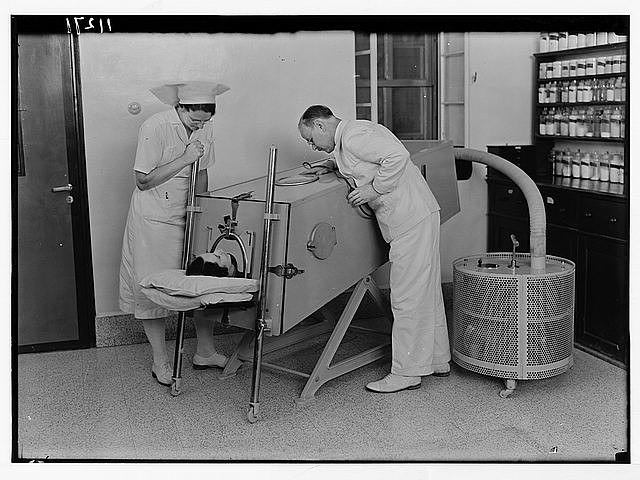 Doctor attending to a polio patient in an iron lung
Doctor attending to a polio patient in an iron lung
Ocean Robbins: I have been fortunate to share many adventures with my dad and remain in awe of his accomplishments despite his early prognosis. His youthfulness has also been remarkable. However, I must share some serious news. Post-polio syndrome (PPS), a condition that often affects polio survivors decades after their initial illness, has emerged in my dad’s life. PPS can cause the return of polio symptoms, typically 15–40 years post-infection, impacting mobility, sleep, breathing, and cognitive function. It’s considered a progressive and irreversible condition.
In 2019, over 65 years after his childhood polio, my dad began experiencing early symptoms of post-polio syndrome. We want to share this journey with you – what it means, how he’s coping, and what we can all learn from it. I believe his approach to this challenge is profoundly insightful, and I am personally learning a great deal.
I am honored to welcome my father, John Robbins, to join us in this meaningful and personal conversation.
John Robbins: Thank you, Ocean. Your love is invaluable, and being your dad is one of my life’s greatest blessings. I’m grateful to share this moment with you, as we have shared so many wonderful times.
Ocean Robbins: Me too.
Polio Then and Now: John Robbins’ Perspective
John Robbins: I’m about to share something deeply vulnerable, which may surprise or even shock some of you. This is, by far, the most personal revelation I’ve ever made publicly. I share this openly, hoping my journey will offer support to you on yours.
Ocean Robbins: I deeply appreciate your vulnerability in sharing this with us.
Many viewers may not be familiar with polio as it has been largely eradicated in recent decades. However, in 1952, when my dad contracted it, polio was a terrifying global threat. It killed thousands of children and paralyzed tens of thousands more in America each summer. Globally, millions were affected. We can celebrate the significant reduction in polio cases worldwide. In recent years, only a few hundred cases of wild polio occur annually, primarily in Pakistan and Afghanistan.
I know these memories are difficult, but could you share your childhood polio experience?
John Robbins: Yes, I can.
John Robbins’ Childhood Polio Experience and Recovery
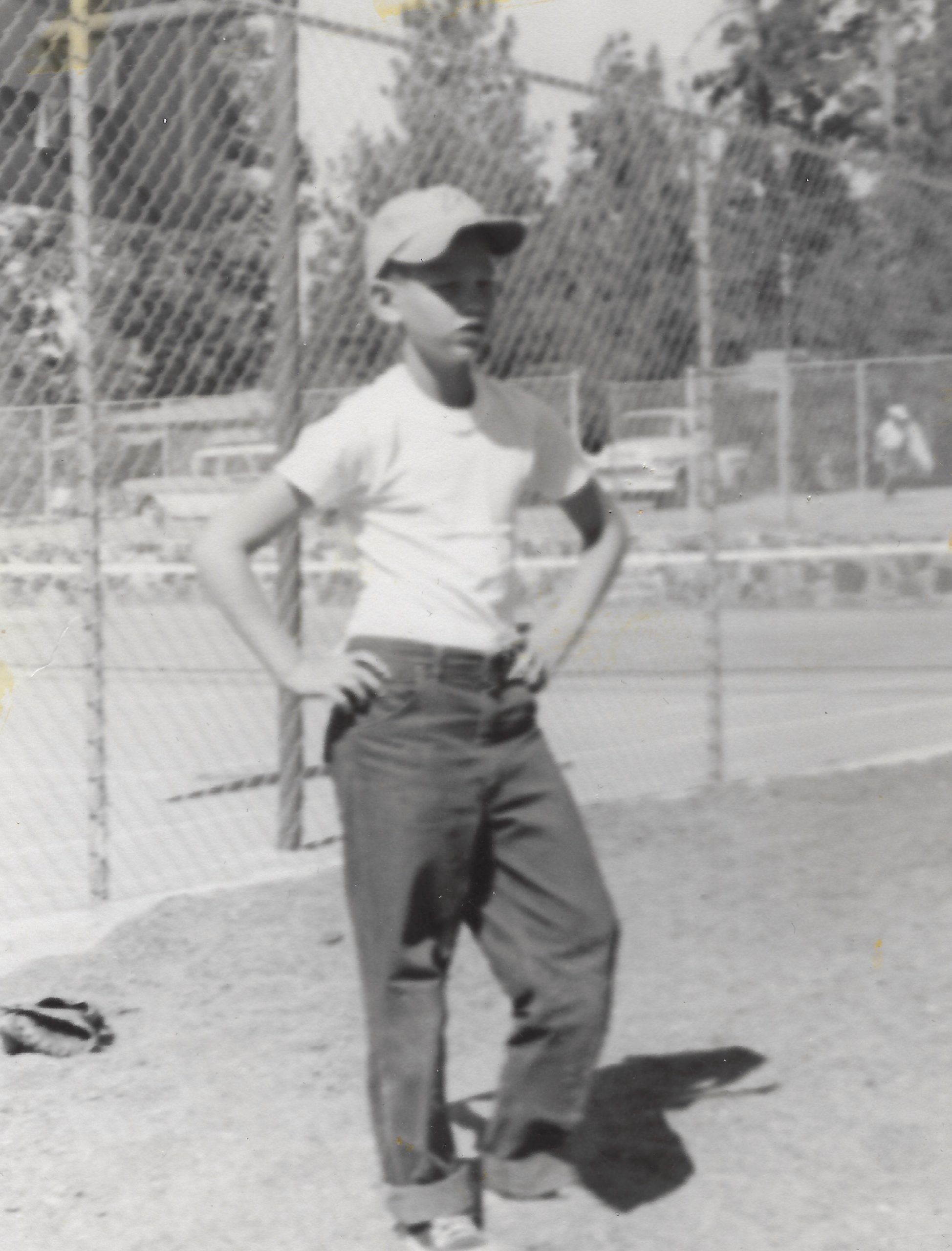 Young John Robbins playing baseball
Young John Robbins playing baseball
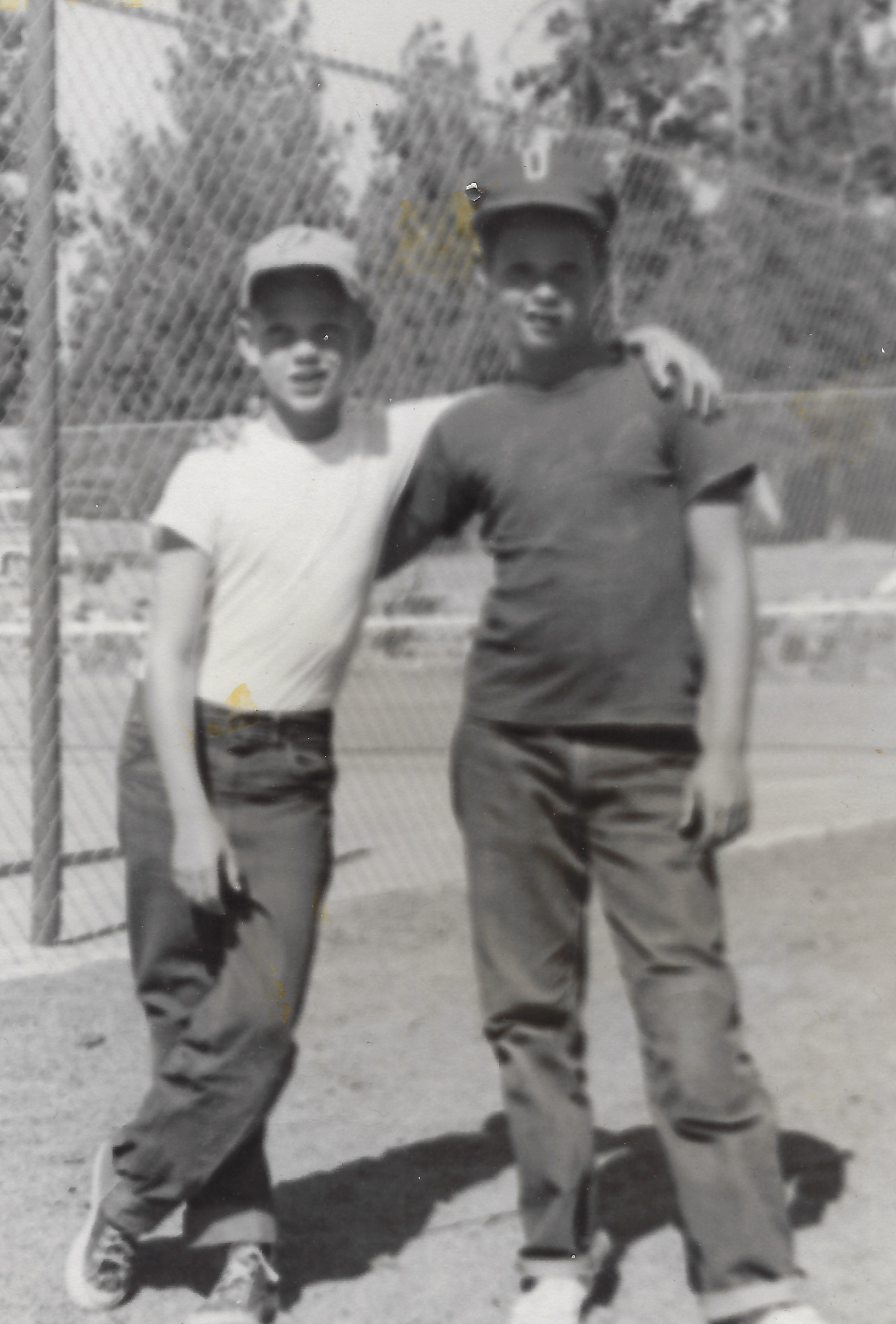 Young John Robbins with a friend
Young John Robbins with a friend
John Robbins: I contracted polio at five years old, in 1952. My case was milder compared to many others; I never needed an iron lung. However, I completely lost the use of my legs, and doctors were unsure if I would ever walk again.
I eventually regained some mobility, but my left leg remained underdeveloped for a long time. Throughout my youth, I walked with a noticeable limp, which was painful. It was a challenging childhood, although many children suffered far worse from polio.
In school, I was always the last one picked for sports teams due to my difficulty walking. Childhood photos of me standing often show me placing minimal weight on my left leg. Sometimes, I had to lean on someone taller just to stand upright. At 18, I still couldn’t put much weight on my left leg and required three-inch lifts in my left shoes to walk at all. Doctors then told me I would never walk normally.
The Role of Diet and Lifestyle in Healing
John Robbins: Then, a truly wonderful event happened. In early 1967, I met Deo, Ocean’s mother, and fell deeply in love. I’ve been incredibly fortunate to be married to Deo for 57 wonderful years.
Ocean Robbins: I wasn’t around yet, but I know what happened next.
My dad has never accepted a medical diagnosis as a fixed destiny. Shortly after meeting my mom, they both radically changed their diets and lifestyles. They adopted a whole foods, plant-based diet – before it was even a recognized term. They began practicing yoga for hours daily. Although standing poses were impossible, my dad became remarkably skilled in other yoga postures.
He became a yoga instructor and even trained yoga teachers. He also started addressing the physical traumas evident in his body. Can you share what happened after that?
John Robbins: Yes, I’m happy to share this positive part of the story.
After five or six years of this new lifestyle, I began experiencing unexpected improvements. My left leg, and my entire left side, grew stronger. My body alignment improved significantly, and my posture became much better. I started being able to stand with some weight on my left leg.
Eventually, I no longer needed shoe lifts. My walking improved, and I even found I could jog a little. My fascination with body mechanics led me to study various forms of bodywork, and I became a professional bodyworker. This, along with teaching yoga, supported our family before I became an author. My left leg was still weaker than my right, but I eventually walked normally and even ran.
Ocean Robbins: It’s absolutely true!
From Walking Difficulties to Mountain Climbing: John Robbins’ Athletic Achievements
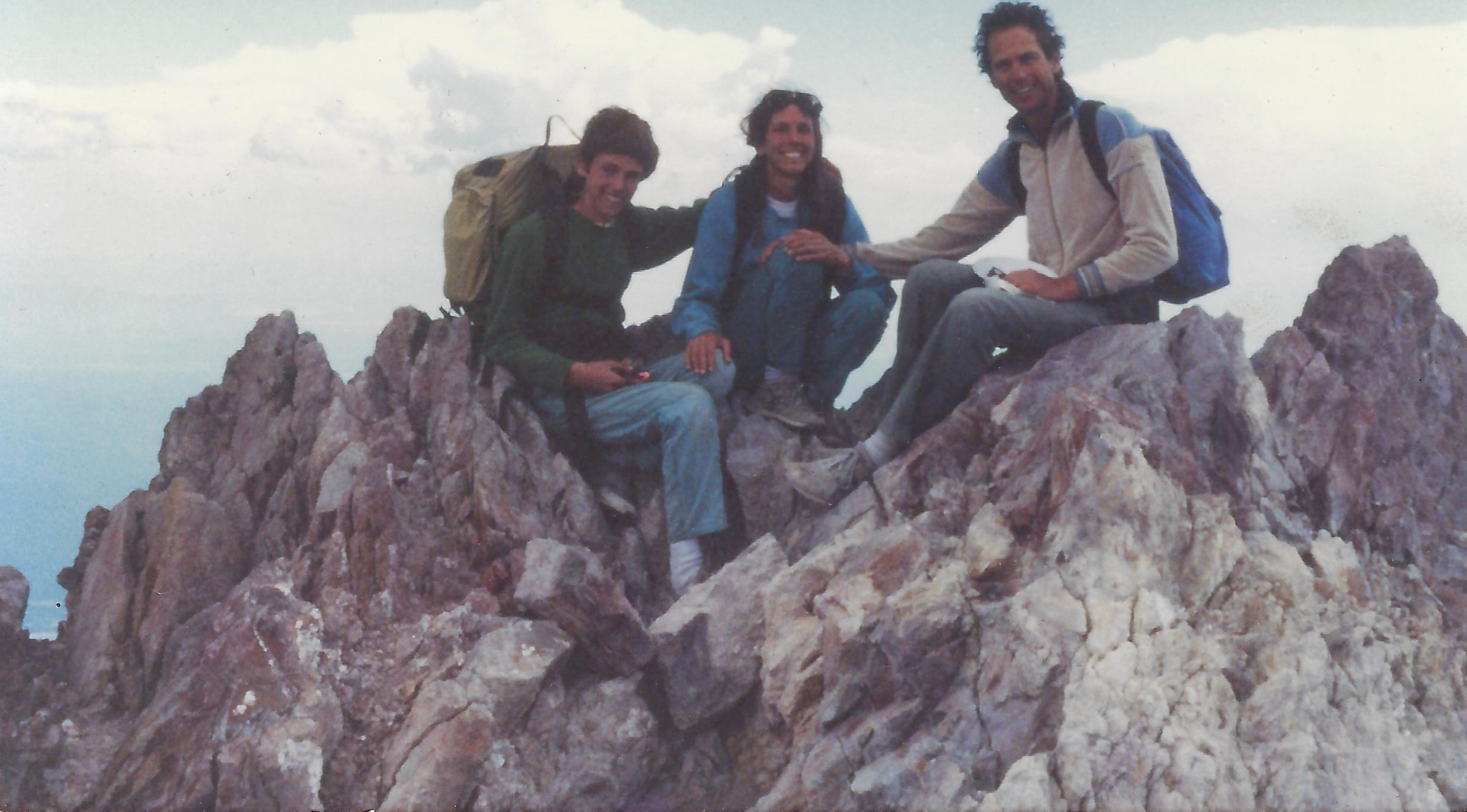 The Robbins family on Mt. Shasta summit
The Robbins family on Mt. Shasta summit
Ocean Robbins: Over the following decades, my dad achieved a level of health and athletic ability that would have seemed impossible during his childhood. Even in his sixties, he was still running and climbing mountains. At 60, he graced the cover of a magazine, celebrated as an example of “the new old,” representing aging with vigor and vitality, shown running.
I have countless cherished memories of athletic activities with my dad growing up. We enjoyed basketball, Ultimate Frisbee, mountain climbing, backpacking, and countless hours of running together. I ran my first marathon at ten, with my dad running right beside me. These are some of the happiest memories of my life.
Our favorite mountain to climb was Mt. Shasta, over 14,000 feet high. We climbed to its peak several times, always choosing the challenging “Misery Hill” route. Once, we even convinced my mom to join us, and with our help, she reached the summit too.
John Robbins: I remember it all vividly. Having spent my childhood and adolescence unable to play sports or walk comfortably, experiencing this level of physical freedom has been incredibly liberating and joyful. It’s also been a privilege to share my discoveries about the human body’s potential when nurtured with the right food, attentive listening, and maximizing our inherent capabilities.
Ocean Robbins: I’m deeply grateful for that as well.
Post-Polio Syndrome Symptoms: A New Challenge for John Robbins
Ocean Robbins: Today, my dad’s life and work have profoundly influenced the modern food revolution. Ironically, the very lifestyle choices he advocates are what transformed his own health. Yet, we are here today because of a new and concerning reality: my dad has developed post-polio syndrome, or PPS. While PPS may be unfamiliar to many, it affects a significant portion of polio survivors, especially those who pushed themselves to achieve much despite their initial illness.
Medical research indicates that PPS affects 25–40% of polio survivors. Unlike polio itself, PPS is not contagious, but it is serious. Muscles weakened by the original polio can weaken again. Common symptoms include brain fatigue, concentration and memory problems, and difficulties with breathing and swallowing. Sleep apnea, chronic stress, irritability, anxiety, insomnia, and depression are also typical symptoms. Western medicine currently offers no cure or treatment for PPS, and symptoms generally worsen over time.
While PPS typically emerges 15–40 years after the initial polio infection, in my dad’s case, it appeared more than 65 years later. A leading post-polio syndrome expert mentioned he knows of no other case in medical history with such a delayed onset. He believes my dad’s healthy diet and lifestyle are likely responsible for his decades of excellent health preceding this.
John Robbins’ Approach to Managing PPS Symptoms
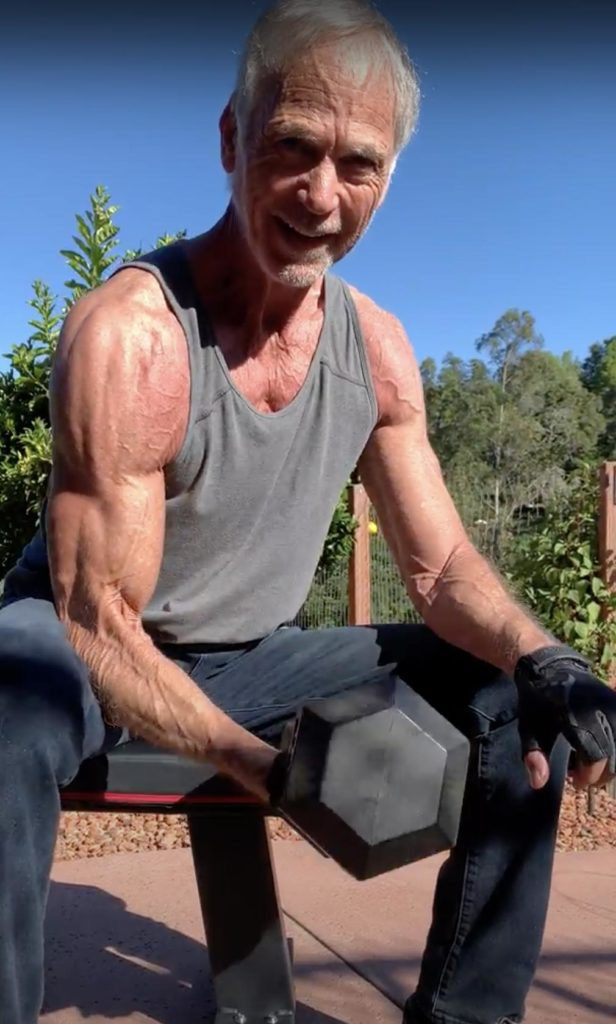 John Robbins weightlifting to maintain upper body strength
John Robbins weightlifting to maintain upper body strength
Ocean Robbins: And now we come to a difficult part of our conversation. Dad, can you describe what you’re experiencing?
John Robbins: Yes, I can.
Starting in 2019, I began noticing PPS symptoms. They have intensified over the years. Walking has become very challenging. I’m doing my best to exercise as much as possible, which is difficult when your legs are unreliable. I’ve rediscovered how many exercises depend on functional legs!
Thankfully, my upper body remains largely unaffected. My exercise now focuses on weight training to strengthen my upper body. I find strength and even joy in challenging the muscles that still function well. It’s a way to maintain vitality.
I believe in maximizing what I have left, which now means spending significant time in the gym. I’ve been surprised by the variety of upper body exercises I can do while seated. Naturally, I’m also eating as healthily as ever, perhaps even more so. I’m committed to doing everything possible to maintain my quality of life.
Importantly, I’m trying to learn and love through this journey with PPS. When I feel depressed or self-pitying, I often list things I found beautiful that day or focus on what I love – not just like, but truly love. That makes a real difference.
Navigating Shame, Pain, and Vulnerability
Ocean Robbins: That’s deeply moving. You’ve always been an example of making the best of any situation, and this is no different. It’s clearly paying off; your upper body strength is incredible. Your blood pressure is excellent, and all your health metrics are exemplary. X-rays and scans show no arthritis in your 76-year-old body. If upper body strength were everything, you’d be dancing with the stars!
John Robbins: Yes, but PPS is now part of my life, and it’s not easy. Pun intended.
This is personally difficult. At times, I’ve felt ashamed because I’ve dedicated my life to promoting healthy choices for aging well. Brené Brown, an expert on shame, says shame thrives in secrecy and silence. Thank you for allowing me to share this openly, breaking those chains.
Because of the progressive loss of leg function, marathons and mountain climbs are over. Now, I’m limited to slow, short walks on level ground, and I don’t know how much longer even that will last. I experience almost constant leg pain, cramps at inconvenient times, and persistent fatigue.
Brain fatigue is another common PPS symptom. While I still have periods of mental clarity, like now, they are shorter and require more frequent rest. PPS also disrupts my sleep.
Finding Serenity, Gratitude, and Inner Peace
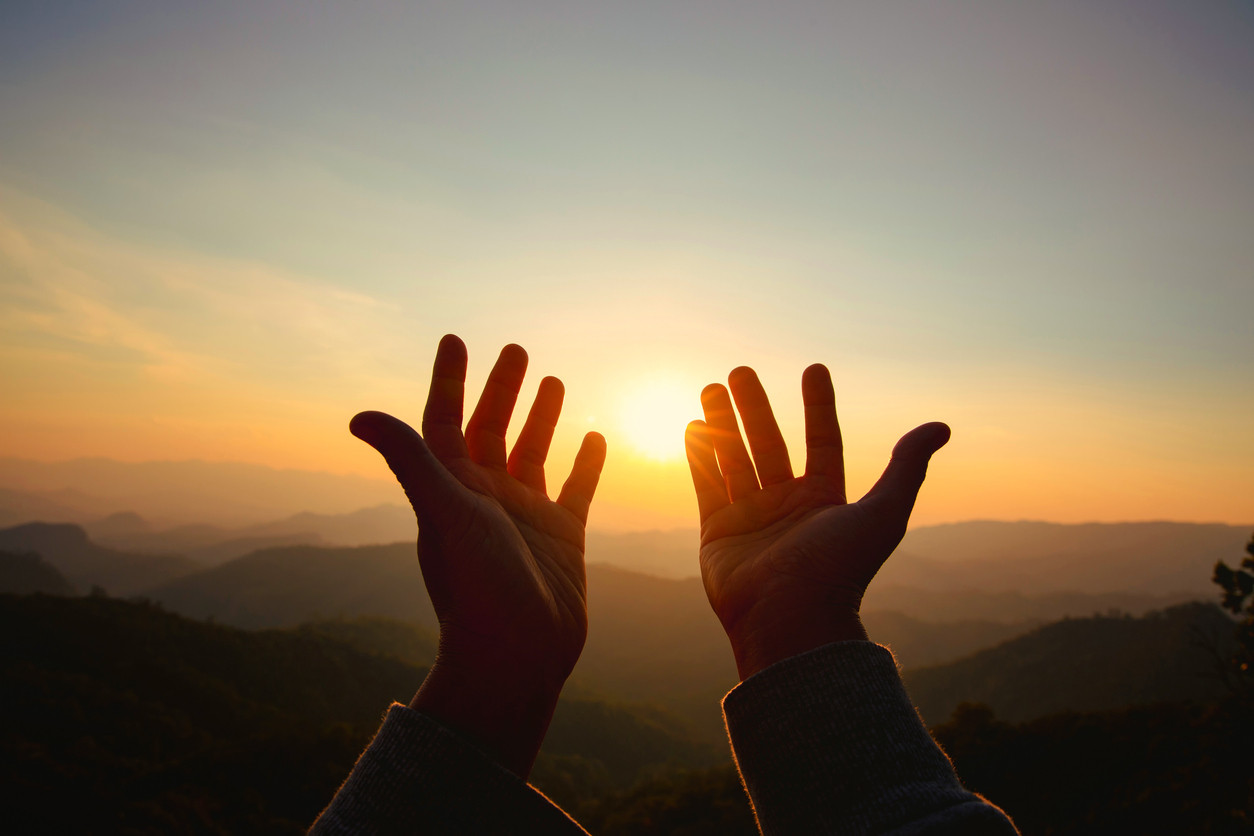 Hands open in worship and gratitude
Hands open in worship and gratitude
Ocean Robbins: This is all very sad, especially for you, and for everyone who loves you, including me.
John Robbins: Thank you, Ocean. Your love and support throughout this journey mean everything.
Ocean Robbins: It might sound cliché, but I am truly proud of how you are handling this.
While few of us have PPS, most can relate to doing our best and still not achieving desired outcomes, whether in health, parenting, work, finances, or other areas. We all face the reality that some things are within our control, and some are not.
What are you learning from this? Are there any positives you can find in this suffering?
John Robbins: I’ve always believed our response to life’s inevitable challenges shapes us. Joy doesn’t come from a life without grief, but from how we care for ourselves and each other amidst heartbreak.
I often return to the Serenity Prayer: asking for serenity to accept the unchangeable, courage to change what we can, and wisdom to know the difference. Working out, eating cleanly, and cultivating gratitude are my ways of changing what I can. We all live in vulnerable bodies and face aging. Sometimes, we must find serenity to accept the unchangeable.
Ocean Robbins: That’s so true.
Finding Joy Amidst Sorrow: A New Perspective
Ocean Robbins: Taking it more personally, how is that acceptance going for you?
Maybe we’re here not just to change the world, but also to love the world. Not just to change ourselves, but also to love ourselves — with all of our goodness and all that’s shattered, with all of our coherence and all our contradictions, with all of our beauty and all our brokenness.
John Robbins
John Robbins: PPS has been incredibly challenging. I’m no stranger to hardship, but recently, I’ve needed every inner resource to continue in a body that’s both fit and failing. My goal is to find as much joy as possible, even with PPS.
Some might question speaking of joy alongside PPS. Many see joy and grief as opposites, happiness as the absence of pain and sorrow. But I’ve realized that’s not true. Happiness and joy arise from how we care for each other and ourselves through life’s heartbreaks and grief.
Perhaps we’re here not just to change the world, but to love it. Not just to change ourselves, but to love ourselves – with all our perfections and imperfections, strengths and weaknesses, beauty and brokenness. Maybe we’re here to do our best for a better world while loving the world as it is, and ourselves as we are.
Multifaceted Health Outcomes and Life Realities
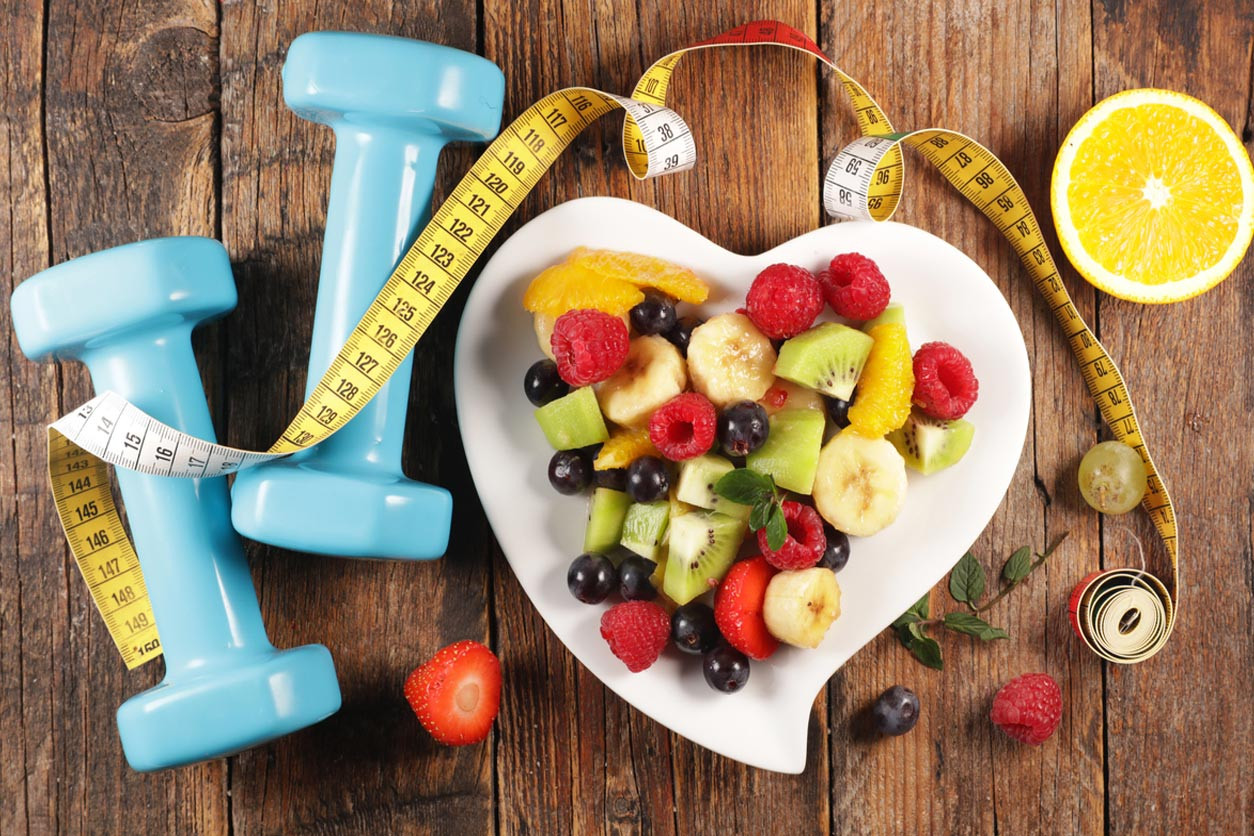 Healthy food and fitness equipment symbolizing holistic health
Healthy food and fitness equipment symbolizing holistic health
Ocean Robbins: Yes. Many feel like they’re doing everything right, yet life keeps throwing challenges their way.
John Robbins: That’s certainly true.
Lifestyle choices like healthy eating, exercise, avoiding smoking, and minimizing exposure to toxins are crucial. Meaningful relationships also matter deeply. Yet, despite our best efforts, we are all exposed to pollution, toxic substances, and even toxic people. We face climate change, social distrust, war, and economic inequality. Personal traumas also take a toll.
Ocean Robbins: Yes. Many factors make life tough. Personal lifestyle choices help, often significantly. But many things are beyond our control.
Avoiding Victim Blaming in Health and Wellness
John Robbins: Exactly. Focusing on controllable aspects of our lives is empowering. But we don’t need more victim-blaming in wellness.
My friend Claire Townsend lived a remarkably healthy life – organic, plant-based diet, non-smoker, successful career, beautiful spirit. Yet, she died of breast cancer at 43.
Healthy lifestyles can work wonders, but they don’t prevent everything. Some people eat perfectly, exercise, have healthy relationships, but still can’t lose weight or get terminal illnesses. When we do everything “right” and still get sick, we might feel confused, angry, or ashamed, blaming ourselves. But that’s often not the reality.
In every life, there will be pain we can’t avoid, and that we must seek the serenity to accept.
John Robbins
Ocean Robbins: Yes. A friend with cancer was asked why he got it, as if it were his fault. He may have made choices that increased his risk, but the question felt cruel. What do you think?
John Robbins: We need to be kinder to ourselves and each other. My PPS experience shows two things: the importance of healthy living and the importance of compassion for what we can’t heal. In every life, unavoidable pain exists, and we must find serenity to accept it.
Ross Gay, a poet, said the only people who might avoid heartbreak or sorrow are those without relationships, who love nothing, sociopaths, or the enlightened. I don’t fit any of those categories.
The Power of Love and Connection in Difficult Times
Ocean Robbins: Me neither. What makes the pain more bearable for you?
John Robbins: Love and connection. How we are with each other and ourselves in pain is the source of our deepest joy and happiness. I’m deeply grateful for my friends, colleagues, allies, and everyone listening with open hearts. Especially my wife Deo, our family member Teresa, and you, Ocean.
A Deep Father-Son Bond
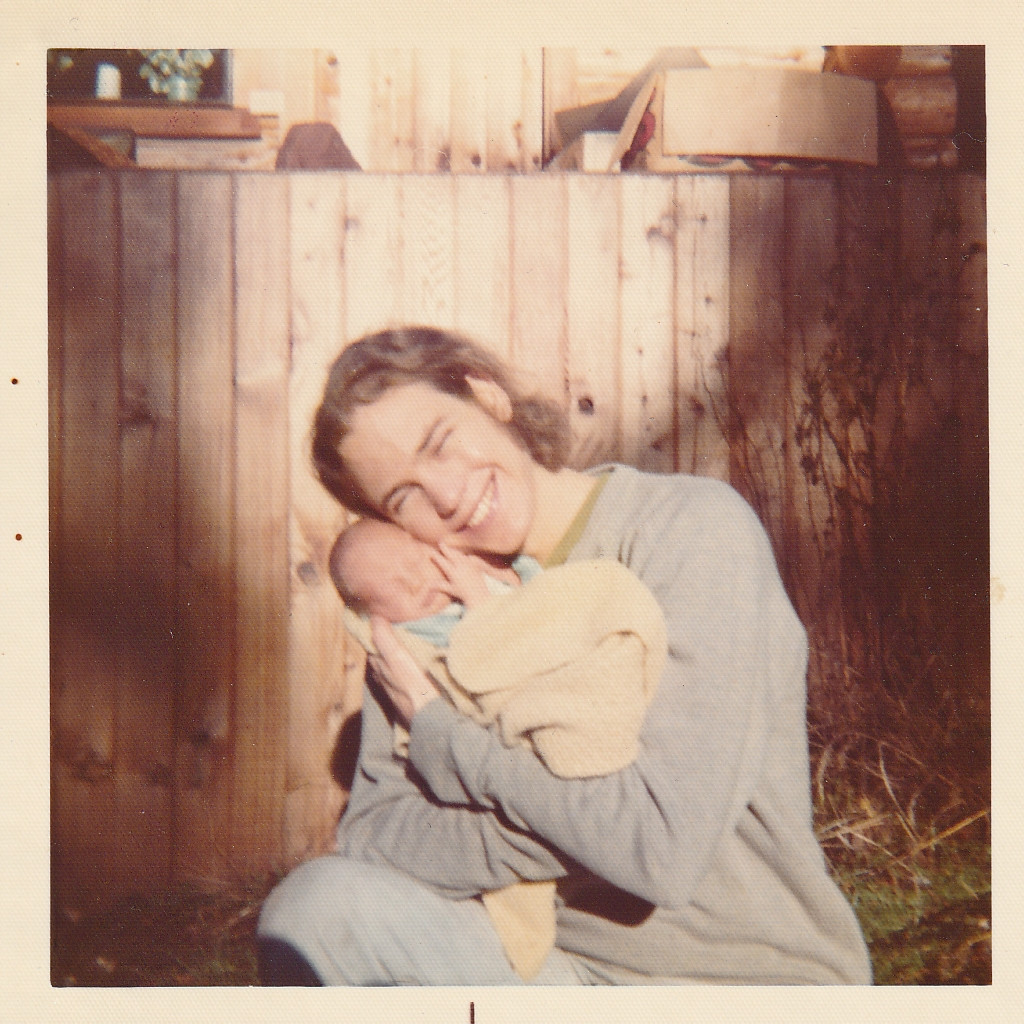 John Robbins holding baby Ocean
John Robbins holding baby Ocean
Ocean Robbins: You loved me completely when I was vulnerable, so loving you now in your vulnerability is precious to me, and to all who love you. Of course, I’m sad. I love you so much, and seeing you in pain is hard. I know you’ll likely pass away before me, which is difficult to accept.
This awareness of your humanity and mortality makes me reflect on what truly matters and appreciate how blessed I am to have you as my father. You’ve been my strength, wisdom, and support. One of my earliest memories is you carrying me in a backpack in the Canadian wilderness, singing to me. Later, you were my writing teacher, public speaking coach. For 12 years as CEO of Food Revolution Network, your support as president has been unwavering.
Many facing a loved one’s mortality feel regret. I feel immense gratitude for everything we’ve shared. Every day we work together, share stories, and love is precious. I don’t take any moment for granted. Being your son and colleague is one of my greatest joys.
John Robbins: Oh, thank you, Ocean. Your love is healing. Being your father has been wonderful. Your mom and I often say we won the lottery when we had you – and have said it every year since you were born.
Ocean Robbins: Oh, that’s so sweet! I’m blushing.
Growing Through Challenges: Compassion and Humanity
Ocean Robbins: Anything else you want to share with viewers about your PPS journey?
John Robbins: I’ve learned the importance of compassion in this journey. Initially, I resisted the pain and limitations of PPS and still have dark moments wanting to cry out, “It’s not fair!” But the compassion I’ve received has deeply touched me, inspiring me to have compassion for myself.
I’m gradually learning to see my disability not as shame or something to hide, but as an opportunity to embrace aspects of myself I’d pushed away. This isn’t making me special, but more human. I’m inspired by people who’ve grown in meaning and purpose through setbacks, illness, or heartbreak.
Perhaps you know someone like that, or are that person yourself. Maybe life’s heartbreaks have shaped you, helping you grow in wisdom, faith, or compassion, aligning you with your life purpose.
Learning and Growing from Hardship
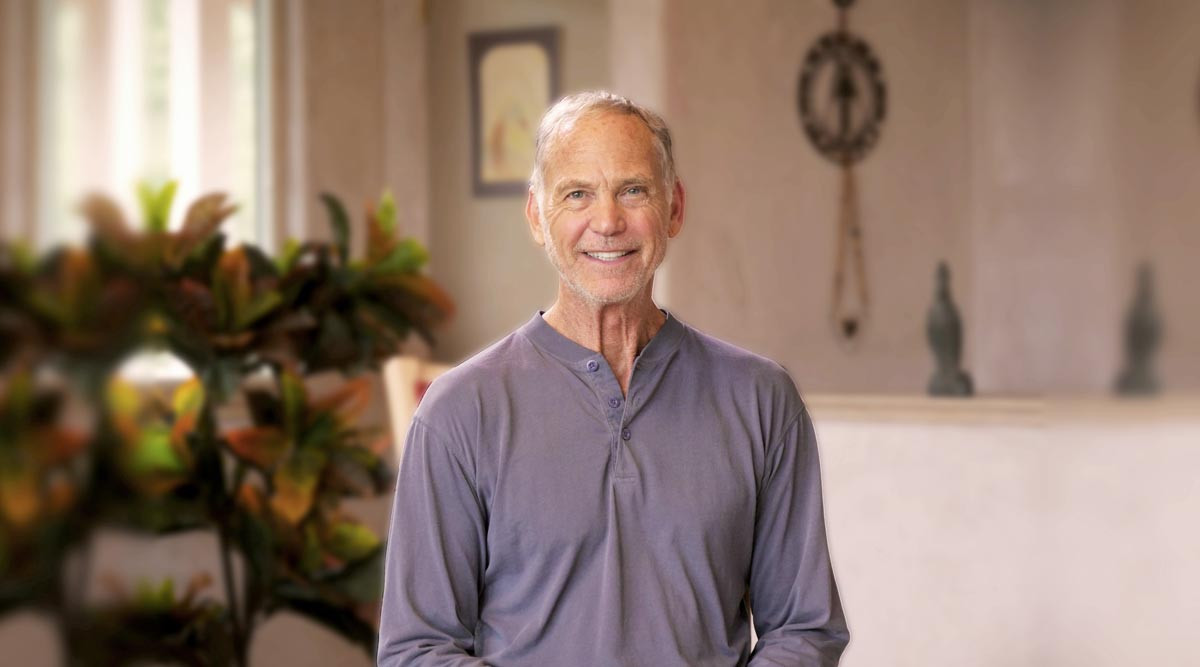 John Robbins portrait, a symbol of wisdom and resilience
John Robbins portrait, a symbol of wisdom and resilience
Ocean Robbins: I’m tearing up. What you’re saying is profound. Most see a crippling condition as a dire threat, something to avoid at all costs. But you seem to be finding value here and sharing that value with us.
John Robbins: Sometimes more than others.
Ocean Robbins: Yeah.
John Robbins: I’ve had self-pity moments. I can do “poor me” well. But each time, I learn how self-pity isolates, entrenches pain, and separates me from love and connection. I wouldn’t wish PPS on anyone. But since it’s a part of my life, I need to ask: what can I learn from this that’s valuable? Asking that helps me see PPS as more than just cruel and senseless.
Ocean Robbins: It reminds me of someone with a fatal illness saying they couldn’t afford negative thoughts.
John Robbins: I have plenty of negative thoughts! But dwelling on loss leads to despondency.
Gratitude and the Food Revolution Movement
John Robbins: Focusing on gratitude lifts my spirits and connects me to our shared humanity. I have so much to be grateful for, including this conversation.
Ocean Robbins: I’ve noticed your consistent gratitude.
John Robbins: Whenever I can, Ocean.
If we can still make positive choices and contribute to others’ well-being, that’s grace. I never want to forget that. I want to express thanks. I’ve been blessed beyond measure to help build a movement against a food system that harms animals, the environment, and human health. A movement for health, compassion, and respect for ourselves, each other, and nature.
I’m inspired by those choosing a healthier path, taking Food Revolution Network courses, participating in summits, reading my books, or bringing more beauty into their lives. I’m inspired by those present here, when you could be anywhere else.
Ocean Robbins: Yes.
The Future of Food Revolution Network
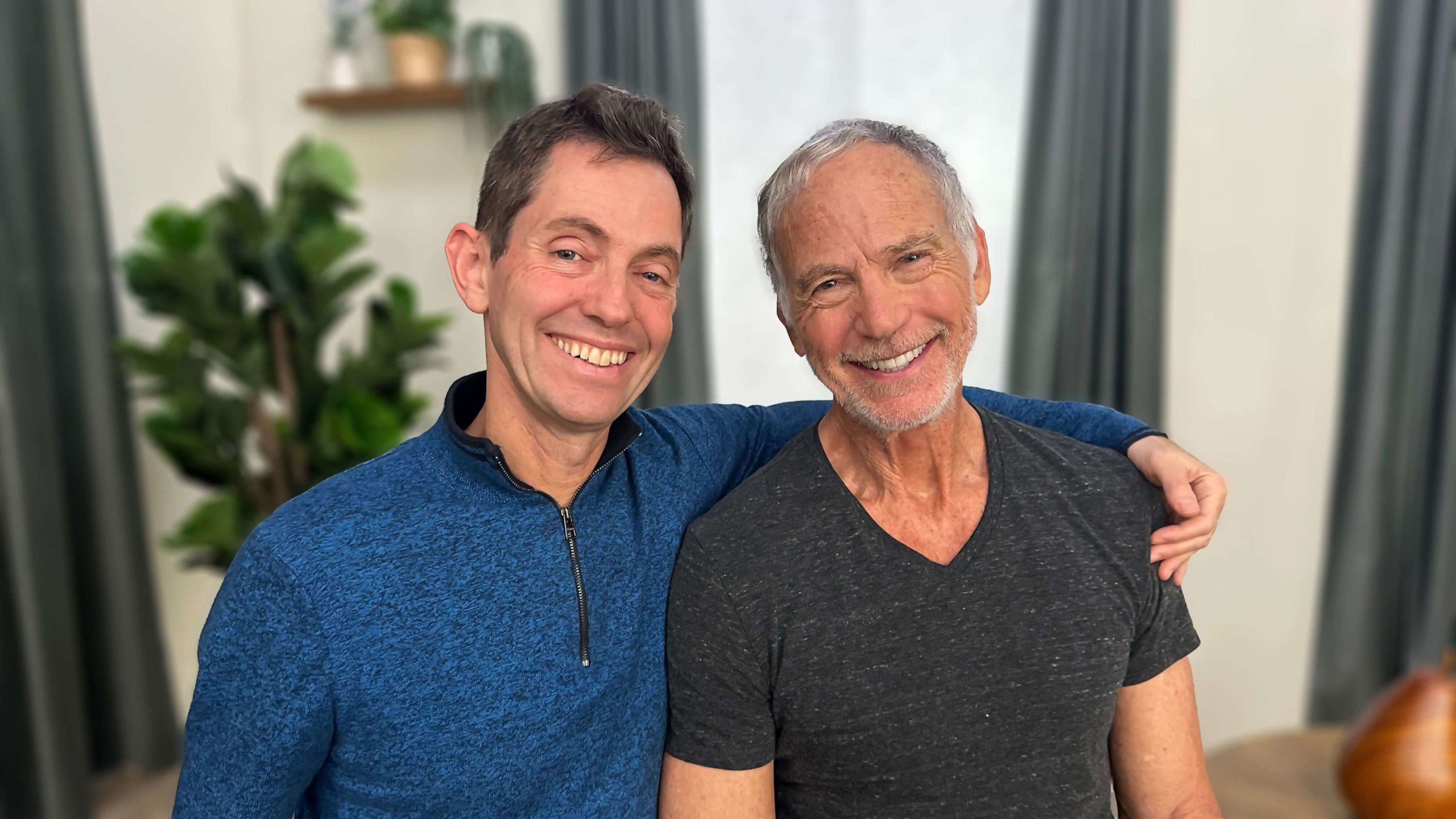 Ocean and John Robbins in a professional setting
Ocean and John Robbins in a professional setting
Ocean Robbins: Some may wonder about the impact on Food Revolution Network and our work together. We and our team are more passionate than ever about our mission of healthy, ethical, and sustainable food for all. For decades, my dad’s life and work have been devoted to this revolution.
We’ve seen incredible results, nearly a million members, and countless messages of gratitude. We’re grateful to everyone joining this loving community. We’ll continue creating courses, summits, films, articles, and resources to empower healthy living.
In the coming years, we’ll continue campaigns for nutrition education, ending factory farms, prescribing fruits and vegetables, and supporting vulnerable communities. We’re maximizing my dad’s involvement while minimizing stress. His wisdom guides us. Hopefully, you’ll see him in our summits and programs for a long time.
Food Revolution Network is bigger than any one person. It’s a growing movement saving lives and bringing healing.
John Robbins: Yes. I love this work and plan to contribute as long as I can. It brings me joy. And doing it with you, Ocean, is a great joy.
Ocean Robbins: For me too, with you. So much. I hope you know that.
John Robbins: Oh Ocean, I do. I so do.
Continuing the Journey Together
Ocean Robbins: Any final words for us today?
John Robbins: To everyone here, whether you’re a long-time supporter or new to our community, thank you for your presence and for contributing to a better world. Those working for more love inspire me and have helped me continue through discouragement.
To those struggling with incurable chronic conditions, I offer my heart, understanding, and love. We don’t know how much time we have left, but I intend to continue this work with you, with Ocean, and my family. It’s been an incredible journey, enriched by so many of you. I look forward to our continued partnership in the near and distant future.
May all be fed. May all be healed. May all be loved.
Ocean Robbins: May all be fed. May all be healed. May all be loved.
Editor’s note: To learn more about John and Ocean’s work, click here.
